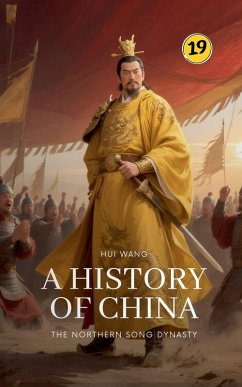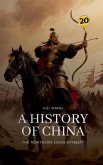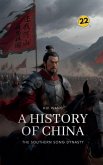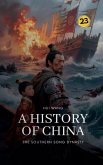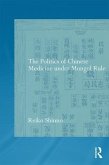The Northern Song Dynasty: A History of China, PART ONE, transports you back to an era when a fragmented land was being stitched together - when battlefield commanders could become emperors, when poets and scholar-officials shaped the currents of policy, and when the fate of a dynasty sometimes hinged on a single, shadowy night. I wrote this book to bring that world to life, to let readers feel the tension, ambition, and brilliance of the men and women who built one of China's most luminous ages. This is not a dry chronology; it is a story of courage and betrayal, of conscience and calculation, and of the human drama that unfolded behind the throne. You'll begin with "The Yellow Robe at Chenqiao," the famed episode in which Zhao Kuangyin - later Emperor Taizu - rose from soldier to sovereign and founded the Song. From there, "A Cup of Wine Ends the Sword" recounts the famous (and much-debated) episode by which he neutralized the power of his generals and tightened imperial control. "The Chancellor's Chair and the Long-Winged Hat" lays out the political chess of the early court, while chapters such as "Zhao Pu, The Mind Behind Two Emperors" reveal how a single minister could shape policy across reigns. And in "The Candle Shadows and Axe Sound Mystery" I follow the whispers and riddles that clung to sudden deaths and successions - stories that history records but cannot always resolve. These are not inert entries in a ledger; they are the living pulse of an empire struggling to find its balance. As the story unfolds, you'll march with armies in "First the South, Then the North," witness the collapse of the Ten Kingdoms under Taizong's rule, and feel the ache of losing the Sixteen Prefectures. The Song emperors dreamed of stitching the realm back together, but each victory carried its own tax-precision of sword, cost of lives, and the slow toll of concessions. I wanted readers to taste not just triumphs, but the doubts, the painful trade-offs, and that quiet, stubborn resolve that became this dynasty's backbone. In the later chapters - from "Silver, Silk, and the Chanyuan Pact" to "The Heavenly Text" and the Fengshan rites - the stage shifts from plains and sieges to courts and ceremonies. You'll meet Emperor Zhenzong, the ruler who chose to swap open warfare for negotiated peace and then sought Heaven's endorsement through spectacular rites and claims of celestial signs. These scenes show how the Song learned to wield power not only with armies, but with ideas-through art, ritual, and the careful shaping of belief and intellect. I've spent years weaving together chronicles, legends, and the little details most histories leave out, trying to bring the Song Dynasty to life - vivid, flawed, and unmistakably human. If you're a history lover, a writer hunting for a spark, or simply a curious reader drawn to what many call ancient China's golden age, come step inside this world. Meet its emperors and generals, its poets and merchants, its dreamers and schemers, and you'll see why the Northern Song still speaks to us, a thousand years on.
Bitte wählen Sie Ihr Anliegen aus.
Rechnungen
Retourenschein anfordern
Bestellstatus
Storno

